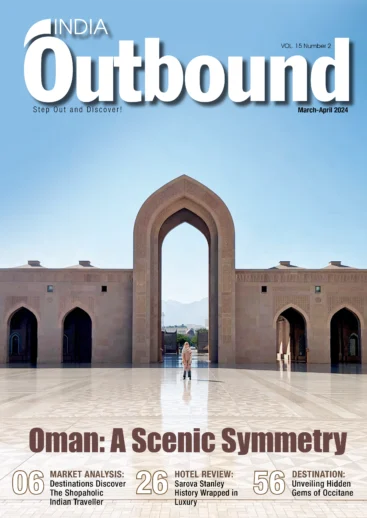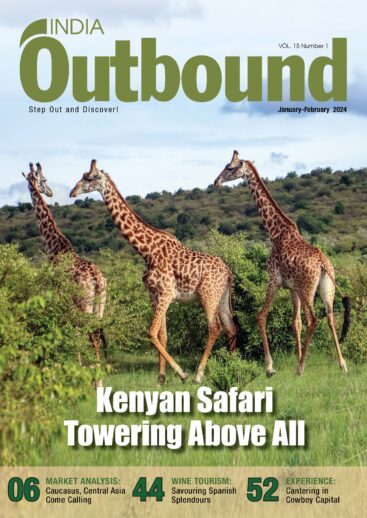
The State of Climate Action in Business Travel - Global Industry Barometer 2023 cites awareness, investment and communication as key factors
Global Business Travel Association, an industry lobby of global business travel has published its latest report on attitudes and actions companies are taking vis a vis climate change.
The State of Climate Action in Business Travel – Global Industry Barometer 2023 cites awareness, investment and communication as key factors in advancing global sustainability.
The report by the GBTA Foundation, the charitable arm of the organisation, says the time has come for the global travel industry to make significant changes for the climate. The results show that ‘business travel is at a critical juncture’ as the sector continues to adapt to new realities and looks ahead to a more resilient future for international travel.
The research was presented last week at the second GBTA Sustainability Summit in Washington, DC, where Suzanne Neufang, CEO of the GBTA, stressed the value of cooperation in fostering a more environmentally friendly future for business travel.
The industry’s readiness to take on the challenge is one of the survey’s significant findings, as 92 pc of respondents believe sustainability is a priority for their organisation, up from 89 pc in a 2022 GBTA report.
Based on survey responses, Europe (98%) along with Asia Pacific and Latin America (both 100%) lead in saying it’s a priority, with North America (86%) slightly lagging the other regions.

Delphine Millot
“Any kind of meaningful impact begins with the knowledge that change is necessary. Engaging business travellers and activating the point of sale to empower them to select more sustainable options will be critical, with corporate travel managers playing a leading role in driving that needed change. But to get there as an industry we must unify standards and make the investments needed to decarbonize business travel,” says Delphine Millot, Managing Director of the GBTA Foundation.
GBTA says that some of the key findings of the report include that companies are investing in sustainability teams. As many 71 pc of travel buyers and suppliers say they have a sustainability team, an increase from last year at 66 pc. While 90 pc of airlines have such dedicated sustainability resources, this drops to 59 pc for the hospitality sector, 58 pc for travel management companies (TMCs), 55 pc for ground transportation, and 50 pc for online booking companies.
It adds that for companies, the biggest drivers when it comes to sustainability uptake are reputation management at 84 pc, coupled with a genuine willingness to drive a positive impact for the planet at 82 pc. Travel managers are being tasked with reducing emissions for their programs. More than half 54 pc of respondents say their company has set either internal or public targets to reduce Scope 3 emissions, which include those from business travel. Another 23 pc are planning to set such reduction targets.
GBTA says that travel managers are being tasked with reducing emissions for their programmes. More than half or, 54 pc of respondents say their company has set either internal or public targets to reduce Scope 3 emissions, which include those from business travel. Another 23 pc are planning to set such reduction targets. In combining trips is seen as a tactic to maximise travel’s return on emissions, 74 pc of travel managers are encouraging, comprising 55 pc or mandating, at about 19 pc, their employees to combine multiple business trips into one.
The survey reveals that travel managers are not always directly acting on the purpose of travel in their policies, with 38 pc reports they currently ask for justification for same-day business trips based on return on investment (ROI) and available alternatives.
The fastest-growing practice will be activating the point of sale to encourage employees to select lower emission options. Only implemented by 28 pc of travel managers now, an additional 32 pc are planning to have sustainability features integrated into their online booking tool.
GBTA says that developing consistent industry-wide standards is a priority for travel buyers. Asked to pick five ways in which the industry should accelerate sustainable change, a large majority of buyers point to harmonised standards on emissions measurement, accounting, and reporting. Meanwhile, 60 pc of buyers requested that GBTA develop harmonised sustainability questions to be used in procurement.
A third of travel managers will soon be in the game for Sustainable Aviation Fuel (SAF) certificates, says GBTA. While only 18 pc of travel buyers currently invest in the purchase of SAF certificates, an additional 16 pc have plans to do so. Of the companies that purchase SAF certificates, 84 pc do so through airlines. Additionally, 38 pc say their companies are currently or expecting to purchase carbon credits to offset their business travel emissions. Financing the green transition continues to present the biggest challenge for both travel buyers and suppliers in decarbonising their programs and operations, with ‘higher costs’ ranking as the number one barrier two years in a row.
According to the study, carbon pricing remains a niche, with only 10 pc of travel managers have established carbon budgets or carbon fees, but this is under consideration by another 23 pc.

















